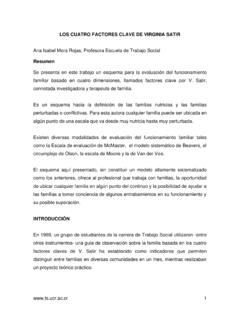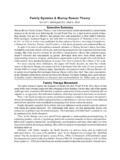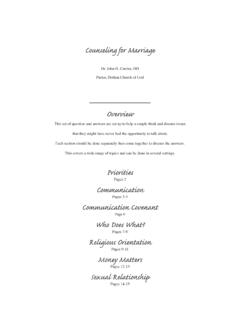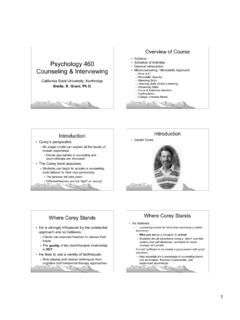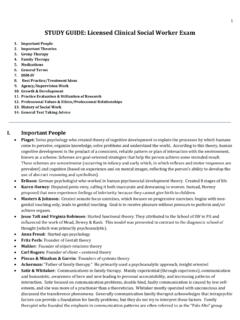Transcription of THE SATIR CHANGE PROCESS - Satir Global
1 2019 Wayne and Eileen Strider adapted from the virginia SATIR CHANGE Model Page 1 of 9 THE SATIR CHANGE PROCESS A Model For Individuals, Groups & Organizations During A CHANGE PROCESS The SATIR CHANGE PROCESS 2019 Wayne and Eileen Strider adapted from the virginia SATIR CHANGE Model Page 2 of 9 1. LATE STATUS QUO Description: Everything is going along as usual. Things feel familiar and predictable and mostly in balance. But, what does each part pay to maintain that balance? UNHEALTH: Some parts are paying much more than they are getting.
2 You may hear people say That s the way I do it here , or It s our way , or It s the only way , or It s the Synergy way. Body Responses: People in this stage may be experiencing anxiety, generalized nervousness, gut problems such as constipation or ulcers. They may have a difficult time locating any specific cause for the ailments. Feelings: familiar, comfortable, safe, unsafe, balanced, bored, restless, dread, anxious, trapped, devalued Healthy and Helpful Coping Ideas: Look at the cost to you and others for maintaining the balance in the old status quo, health problems, boredom, stagnation, out of touch with present reality, unhealthy coping such as smoking.
3 Ask yourself if there is a need to CHANGE - preferably from your own perspective as well as from outside perspectives. Think of positive possibilities for the future from CHANGE ; not only negative, fear generating ones. The SATIR CHANGE PROCESS 2019 Wayne and Eileen Strider adapted from the virginia SATIR CHANGE Model Page 3 of 9 2. FOREIGN ELEMENT Description: Something new arrives from outside that cannot be ignored, though you may try. You may try to deny the foreign element, because FAMILIARITY IS MORE POWERFUL THAN COMFORT.
4 You may say or hear people say, This isn t really going to happen. , or They can t be serious. , or No way. Body Responses: People in this stage may be protective and defensive. They look frozen. They may be holding their breath or hyperventilating. Their senses are diminished, so that they don t see or hear things they usually notice. They may have trouble staying in the present. Feelings: denial, protective, defensive, confused, off balance, afraid, shocked Healthy and Helpful Coping Ideas: Breathe! Acknowledge your feelings are real.
5 Try to separate your imagination from reality. Acknowledge that the CHANGE is real. Open up to the possibility that the new end state will be different, not necessarily worse; perhaps better. Evaluate what you d like to stay the same vs. CHANGE . Identify what you d like to keep vs. let go. Accept that confusion is normal. You don t know exactly what will happen. Identify resources and skills you have to help yourself. Know that fear is normal. Seek help to face your fear and not be paralyzed by it or panicked. Try to understand what is underneath the fear.
6 Understand the effect of the CHANGE on you may be different than for others. The SATIR CHANGE PROCESS 2019 Wayne and Eileen Strider adapted from the virginia SATIR CHANGE Model Page 4 of 9 3. CHAOS Description: Things are in disarray. Old predictions no longer work. Old expectations are not fulfilled. People try random behavior, or revert to even earlier behavior patterns. This is not the time to make long term decisions. You may say or hear people say, This is crazy , or I feel crazy or I can t take this. Body Responses: People in this stage are afraid and vulnerable.
7 Their old survival fears and behaviors may be aroused. They may revert to unhealthy or dangerous coping. They may become extremely defensive and alienated. They may be shaky, dizzy, off balance, and generally suffer problems of the central nervous system, such as nail-biting, mysterious rashes, or panic attacks. Back, head, and neck problems are common. Awareness may oscillate between very high and practically zero. Feelings: angry, afraid, vulnerable, incompetent, alienated, defensive, off balance, crazy, unaware, hyperaware, all over the place Healthy and Helpful Coping Ideas: Understand that your feelings are normal.
8 Re-center yourself with familiar things when you feel too far off balance. Listen carefully and caringly to yourself and others. Ask what will happen Try to separate past from present. Acknowledge what s not going to happen. Avoid long term decisions, , leaving, suicide. Identify what you want/need and ways to get it. Stay in touch with others and with current reality. Try new ideas until you hit on one that transforms how you are changing and moves you out of chaos and into the next stage. The SATIR CHANGE PROCESS 2019 Wayne and Eileen Strider adapted from the virginia SATIR CHANGE Model Page 5 of 9 4.
9 INTEGRATING and PRACTICING Description: People begin to see a new possibility, a light at the end of the tunnel. They begin practicing using this new possibility and integrating it into the rest of their environment. Chaotic feelings diminish, and for a few moments of clarity, everything looks like it will be solved , perhaps by turning some of the old ways upside down. You may talk about, the other way in comparison to my way. Body Responses: Some people describe this stage as feeling like school children again. There is some giddiness and also some anxiety that the good feeling will disappear as easily as it came.
10 People are easily disappointed when things do not work out perfectly the first time. They need much support. Feelings: awkward, giddy, frustrated, hopeful, good yet a little anxious, easily disappointed, cautiously optimistic Healthy and Helpful Coping Ideas: It s okay to feel some excitement; if you feel too giddy, calm and center yourself. Understand that emotional swings are normal during this phase. Recognize what s working well and keep practicing it; Acknowledge set backs are real and normal. Don t punish yourself or blame others.

